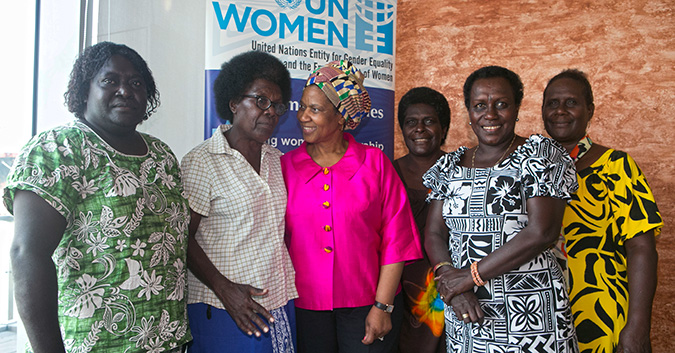‘We must write our own legend’: UN Women’s leader urges female politicians of the Autonomous Region of Bougainville to make their presence felt
Date:
Author: Ornwipa Rugkhla
Autonomous Region of Bougainville, Papua New Guinea — “Keep on fighting,” UN Women Executive Director Phumzile Mlambo-Ngcuka has told female Members of Parliament (MPs) of the Autonomous Region of Bougainville as they shared stories of breaching barriers and rising to political leadership in societies plagued by civil conflict, poverty and sexism.

The two sides compared experiences during a lunch Ms. Mlambo-Ngcuka hosted today for Rose Pihe: a former MP who is President of the Bougainville Federation of Women, and three current MPs: Marceline Kokiai, Member for Central; Isabel Peta, Member for South; and Josephine Getsi, Open Seat and Minister for Community Development.
UN Women has been supporting the four women through the Equality for Progress project, the President of the ARB Women’s Federation and members of the National Coordination Office for Bougainville Affairs.
Ms. Mlambo-Ngcuka was visiting the autonomous region as part of her travels to mark the United Nations’ 16 Days of Activism against Gender-based Violence.
At the lunch, she told the four women leaders of her own journey to parliament and on to become Deputy President in her native South Africa, a country where, as in the Autonomous Region of Bougainville, women faced discrimination in seeking political office. The four women replied that they considered her their role model.
Ms. Getsi told of how she campaigned door-to-door by foot and watched her male competitors drive by in SUVs. She nevertheless beat out 10 men for the seat. “It’s because one of you equals 10 of those men,” said another female MP.
Ms. Mlambo-Ngcuka urged the women “to keep on fighting” and to “support one another.” She said they should campaign for each other and form a bipartisan caucus to create laws and policies for gender equality and to end violence against women.
“Your success is critical,” Ms. Mlambo-Ngcuka said. “Pick key issues that would benefit women and the people and work on them until you deliver. Show everyone that when you elect a woman, she takes action and she delivers.”
“You want the community to know that you are not only the liberators of women. You are the liberators for all those that need your help,” she added.
The Executive Director said support for women’s political participation and leadership would remain a key priority for UN Women.
“Please be certain that you are not alone. We are here to stand with you,” she said. “We also need your support. We count on you to use your position to pass gender equality laws and implementing them to open doors for other women. Sisters, we must write our own legend.”
The people of Bougainville endured an armed separatist rebellion from 1989 to 1997. UN Women has been working there since 2010 to support peacebuilding and to stem violence against women, a widespread problem.
As many as 80 per cent of women reported they had experienced physical or psychosocial abuse by an intimate partner within the previous 12 months, according to a study done by the United Nations Development Programme and UN Women in 2014.
Ten per cent of the autonomous region’s MPs are women. Its constitution reserves for women three seats out of a total of 46. It is the only parliament in the Pacific region that guarantees a minimum level of representation for women.
UN Women has found that supporting female political leadership is critical to efforts to end violence against women because they are best positioned to promote women’s rights. They also serve as important role models for younger women.
About the author
Ornwipa Rugkhla is UNiTE Campaign Coordinator at UN Women Regional Office for Asia and the Pacific, Bangkok. Email: ornwipa...@unwomen.org
For further information
Please contact Jeffrey David Buchanan, UN Women Representative in Papua New Guinea. Email: jeffrey...@unwomen.org